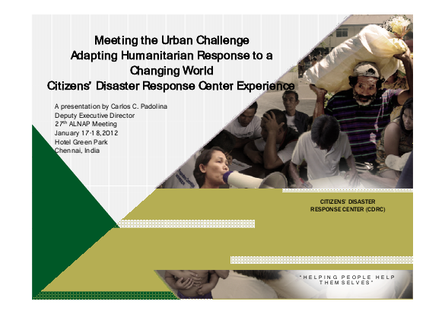
The Philippines is one of the most disaster-prone countries in the world. In the World Disasters Reports, the Philippines ranked consistently among the top five countries affected by natural disasters. Within Asia, it is one of the countries that is affected and will continue to be affected by the impacts of climate change. While it normally experiences at least 20 typhoons a year, the recent years saw more disaster events and were influenced by climate change. The notable changes in the climate of the Philippines include increasing temperature, rising sea level and increased frequency of extreme events. Recently, the Asian Development Bank (ADB), in a report titled "Climate Risks and Adaptation in Asian Coastal Megacities," warned of more massive flooding incidents in Asia’s coastal megacities, including Manila. The ADB said urban poor populations are likely to be the hardest hit. Megacities – with more than 10 million inhabitants – are springing up across the globe, particularly in developing countries. Greater Manila is home to 20 million people, rising by another quarter of a million every year. A third of Manilans live in makeshift settlements, under bridges, next to railway lines, on floodplains, and beside flood defences, making them highly vulnerable to natural and human-induced disasters. People live in adverse socio-economic situations that lead them to inhabit high risk areas and engage in unsustainable and dangerous livelihoods. Earthquakes, although a national occurrence with at least 5 faint shakes experienced on a daily basis, threaten to hit any part of the country anytime due to the fact that the archipelago lies between 2 of the 7 major tectonic plates in the earth’s lithosphere. But despite the findings of a scientific study jointly conducted in 2002-2004 by the Metropolitan Manila Development Authority (MMDA), Philippine Institute of Volcanology and Seismology (PHIVOLCS) and the Japan International Cooperation Agency (JICA) forewarning of a destructive magnitude earthquake in Metro Manila, the government has taken no bold preparatory steps just yet.
Resource collections
- Evaluating humanitarian action
- UN Habitat - Urban Response Collection
- Urban Response - Urban Crisis Preparedness and Risk Reduction
- Urban Response Collection - Community Engagement and Social Cohesion
- Urban Response Collection - Economic Recovery
- Urban Response Collection - Environment and Climate Change
- Urban Response Collection - Housing, Land and Property
- Urban Response Collection - Urban Crisis Response, Recovery and Reconstruction
- Urban Response Collection - Urban Resilience